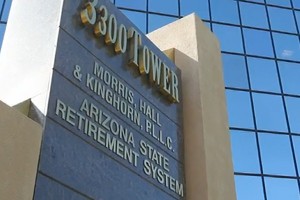GOLD AWARD: Craig Harris, a reporter at The Arizona Republic, received the top gold award in the 2011 Barlett & Steele Awards for Investigative Business Journalism for his series “Public Pensions, A Soaring Burden.”
By Craig Harris
In August 2010, on a blistering hot summer day in Phoenix, I was called into Executive Editor Nicole Carroll’s office. Also summoned was Pat Flannery, my immediate supervisor and deputy metro editor.
Getting called to the editor’s office with your boss typically isn’t good news.
However, on this afternoon, the meeting was the start of what would become an eight-part series in The Arizona Republic on the state’s costly pension systems. And, it would later win the gold award in the 2011 Barlett & Steele contest.
Nicole told us she had been traveling around the country and had read numerous stories about public pension problems, and she wanted us to find out if there were issues in Arizona. Neither Pat nor I had an answer to her question, and despite being a reporter for 20 years I knew nothing about public pensions. I was told to check it out, and we would meet again.
The first thing I did was to ask our outstanding library staff to pull together stories about public pension systems in Arizona and around the country. They quickly filled my e-mail inbox with more than 200 stories, including one from the Arizona Chamber of Commerce and Industry’s efforts to reform the state’s pension system earlier in the year.
After reading the stories over a weekend, I set up a meeting with Chamber officials who expressed great concern that Arizona had huge unfunded liabilities for its pension systems. They also said there were huge loopholes, such as a practice called double-dipping. That allowed a public employee to retire from a job one day and then get rehired back the next while collecting a pension and a paycheck.
I then began my research by filing public records requests with the four statewide pension systems and ones in Phoenix and Tucson. I asked for:
- The list of names of all public employees currently receiving a pension check.
- The monthly and/or annual amounts of each pension.
- The year the individual retired.
- The years of public service for each retiree.
- The last place of employment and job for each retiree.
Five of the six pension systems provided all the information I sought fairly quickly by giving The Republic electronic databases, which I converted on to my computer. And, surprisingly, the administrator who runs the state pension systems for public safety officers, elected officials and corrections officers provided the information within 24 hours.
But the Arizona State Retirement System, the largest pension program in the state, mostly balked.
The ASRS refused to provide the names of pensioners, citing privacy concerns, and the amounts of money they were receiving. The ASRS unsuccessfully attempted to block The Republic from obtaining this information by asking a judge to withhold a database that contained such information. ASRS also sent emails to pensioners warning of the newspaper’s attempts to obtain the information, spreading unnecessary fear among aging retirees that their personal information would be disseminated. Some of those pensioners even contacted The Republic.
Along with the newspaper’s counsel, we met with ASRS and were able to show that every other public retirement system in Arizona had turned over similar information without question, and the fears were not merited. We also made a direct appeal to the Attorney General’s Office, which was representing ASRS, and we drafted a countersuit and informed ASRS of the potential legal fight.
With the threat of legal action by The Republic, the ASRS board of directors then decided to provide all the information the newspaper had sought.
I also filed public records requests with all 57 public-school districts in Maricopa County to see if there were employees who had retired, but had returned to work and were collecting a pension and a paycheck. Most of the districts provided this information to me electronically via e-mail. Some school districts declined to do this, and they required that I come to their district offices and review the records. Some districts also required that I fill out a waiver, promising not to use the information for commercial purposes. Repeatedly, I told the districts there was no state law that required me to fill out their waiver and I was seeking the information for news gathering. To make sure I obtained the documents in a timely fashion (and to save additional legal costs), I signed the waiver.
As I received the records from the school districts, I compiled the information onto a master spreadsheet. I then turned over the records to one of my colleagues, data editor Matt Dempsey, who ran the information against the ASRS database. Dempsey was able to confirm there were at least 920 teachers, administrators and office personnel in 50 of the districts who were double-dipping. Seven of the districts had no employees who were double dipping.
From all this information, we produced a series, “Public Pensions, A Soaring Burden,” that showed:
- Hundreds of public employees were double-dipping, which caused a drain on the pension system.
- The pension systems were collectively costing taxpayers $1.39 billion a year.
- Some elected officials were making more in annual retirement benefits than the top salaries they earned when employed.
- How some convicted felons had been removed from office for official wrongdoing, yet were being paid large pensions.
- How a costly public safety retirement program allowed police and firefighters to defer retirement and receive huge lump-sum payments in return.
- How Phoenix quietly spiked the pay of a former city manager before he retired, allowing him to receive a $246,813 annual pension – more than he made while still on the job.
Until the series appeared, pension reform was not something being discussed or seriously considered by elected officials in Arizona despite widely discussed problems in other states such as California and Illinois, and a wave of sweeping changes to private-sector pensions nationwide.
But after the series ran, the Arizona Legislature passed reform measures that required employees and elected officials to pay more for their pensions, altered the public safety retirement program to make it less generous, prohibited pensions for public employees who committed a felony in the performance of official duties and discouraged the practice of double dipping by making it more costly for public employers who allowed it to occur.
In Phoenix, a pension reform task force has met all year and it plans to send a recommendation to the City Council that would require employees to pay more for their pensions.
While pension systems in Arizona still have a ways to go to become financially healthy, legislation that was passed after our series ran has improved the future status of the funds and closed some of the
loopholes that allowed some retirees to take advantage of the systems.











